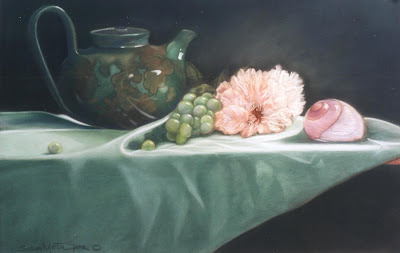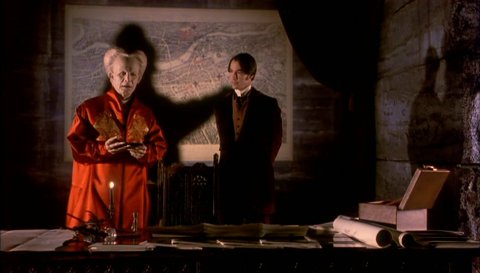Green Tea
 Wednesday, November 4, 2009 at 18:00
Wednesday, November 4, 2009 at 18:00 Our headlines have long since been saturated with the modern notion of the Devil, what we have come to call the serial killer. The circumstances will always be gruesome and the bewilderment of the police will only match their repulsion (although, with the plethora of such events the faces and words of investigators have begun to seem jaded and unshocked), but day in and out we learn of more monstrosities. Now surely some of these flagitious people are the victims of their own crapulence or other such addiction; perhaps they are even inherently rotten in bone and vein. Yet others are often depicted as having been hitherto the model of average citizenship. What compels them to their horrid deeds cannot be explained, not by psychobabble, not by the testimony of neighbors ("he was such a quiet man ..."), not even by the recapitulation of small failures in the course of one human life now construed as a mounting catastrophe. No, there is something else that lays its hand upon your shoulder, directs your gaze and maintains your attention. And the identity of such a being lies at the heart of this tale.
 Three narrators will be refracted through one another like a hall of mirrors: an unnamed philologist and wanderer, "educated in medicine and surgery"; his master, Dr. Martin Hesselius, a Faustian polymath of sinister leanings; and finally, the Reverend Robert Lynder Jennings. We learn almost nothing of our first speaker as he quickly diverts attention to his mentor, more than three decades his senior; yet in truth, little too of Hesselius can be derived. It is the initial Boswellian narrator who translates from the German Hesselius's correspondence to a fourth man, a Dutch scholar by the name of Van Loo, in which his discoveries on the human soul are revealed in scientific detail. Jennings has all the qualities of "a perfectly gentlemanlike man": he is serene but witty, bright but hardly arrogant, and, although moneyed, more interested in the pursuits of his vocation than his estate. There is about him, however, something not lost on the keen observer – and Hesselius is far keener than most:
Three narrators will be refracted through one another like a hall of mirrors: an unnamed philologist and wanderer, "educated in medicine and surgery"; his master, Dr. Martin Hesselius, a Faustian polymath of sinister leanings; and finally, the Reverend Robert Lynder Jennings. We learn almost nothing of our first speaker as he quickly diverts attention to his mentor, more than three decades his senior; yet in truth, little too of Hesselius can be derived. It is the initial Boswellian narrator who translates from the German Hesselius's correspondence to a fourth man, a Dutch scholar by the name of Van Loo, in which his discoveries on the human soul are revealed in scientific detail. Jennings has all the qualities of "a perfectly gentlemanlike man": he is serene but witty, bright but hardly arrogant, and, although moneyed, more interested in the pursuits of his vocation than his estate. There is about him, however, something not lost on the keen observer – and Hesselius is far keener than most:
Mr. Jennings has a way of looking sidelong upon the carpet, as if his eye followed the movements of something there. This, of course, is not always. It occurs now and then. But often enough to give a certain oddity, as I have said, to his manner, and in this glance traveling along the floor there is something both shy and anxious.
Hesselius is thankfully also a man of principles, which means that all those keen observations are not squandered. He believes that "the entire natural world is but the ultimate expression of that spiritual world from which, and in which alone, it has its life." Conviction in a God sublime and indefinable does not impede Hesselius's science, nor, for that matter, his compassion. His friend Jennings is not a man in clover. Proof of his misery comes in the form of that most literary of devices, the casually perused book replete with underlined passages. In this case, the book turns out to be this mystical work, and the most vibrant passage reads as follows:
The evil spirits associated with man are, indeed from the hells, but when with man they are not then in hell, but are taken out thence. The place where they then are, is in the midst between heaven and hell, and is called the world of spirits – when the evil spirits who are with man, are in that world, they are not in any infernal torment, but in every thought and affection of man, and so, in all that the man himself enjoys. But when they are remitted into their hell, they return to their former state.
As implications loom, so does a project to which Jennings has always wanted to devote himself: the religious metaphysics of the ancients. Unlike most monographs that focus on symbols, totems, and rituals, Jennings is drawn to the "actual religion of educated and thinking paganism." And when he begins his study, he finds himself for some inexplicable reason consuming a large daily amount of tea – first black, then green – at which point his life shifts in a most dramatic and terrible direction.
What happens to Jennings will not, of course, be disclosed on these pages. Modern readers accustomed to the narcotic rubbish of the beat or smash or crash generations will sketch large rings around Jennings's claim that all serious writers compose on a substance – be that substance caffeine, nicotine, or something more potent – but these are all cheap conceits. Apart from the suppleness and ease of his prose, Le Fanu's strength as a writer comes from the frequent suggestions that he does not quite believe all of what he describes. That is not to say that his works are insincere (such disingenuousness is reserved almost exclusively for the charlatans and jesters of postmodernism), but rather that two possible explanations may be provided without diminishing the supernatural effect. In this tale it falls to Hesselius to make sense of the events and to bring them onto a plane of human understanding at once intelligible and awesome, and admittedly he wavers so elegantly as to have us doubt the dénouement. If only poor Jennings had vacillated in the slightest.






